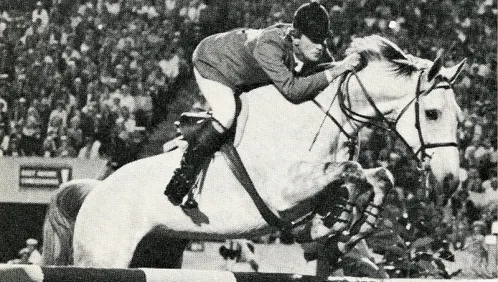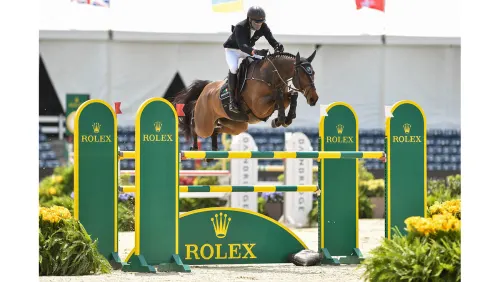The Olympic gold medalists eke out the title over the German defending European champions in Denmark.
British hearts jumped into their throats when Hello Sanctos toppled a rail at the first element of the triple combination. In the final round, Scott Brash had enjoyed a cushion of one rail to clinch a gold medal, and now that cushion was gone. Tensions rose.
After three rounds of grueling jumping over increasingly technical tracks conjured up by German course designer Frank Rothenberger, the PSI FEI European Championships outcome hinged on anchorman Brash, the youngest member of the team, and his London Olympic Games ride Hello Sanctos, an 11-year-old Belgian Warmblood (Quasimodo van de Molendreef—Nasia van het Gravenhof, Nabab de Reve).
There was no room for further mistakes, but the confident Scotsman held his nerve to power home with no further faults and seal gold, to a mighty roar from the appreciative crowd.
“I was very fortunate today as the other three riders gave me a bit of a cushion,” said Brash, 27. “There was obviously a bit of hype ahead of this championship after we had such a big Olympic year, but all the horses were in such good form coming here.”
The British team proved that their Olympic gold in 2012 was no fluke when beating defending European champions Germany by a mere 0.59 penalties in a thrilling battle. British riders also flanked the individual gold-medalist, Roger Yves-Bost of France, on that podium, with Ben Maher taking silver and Brash claiming bronze.
So powerful was the silver medal-winning German squad that big names such as Marcus Ehning and Meredith Michaels-Beerbaum could be bypassed and a string of big hitters remain. Ludger Beerbaum, Christian Ahlmann and Carsten-Otto Nagel lined up alongside young sensation Daniel Deusser. Having come into the final round in fourth position, they produced three clears to come within a whisker of consecutive European titles.
A Deep Bench
Just two members of the British gold medal-winning Olympic quartet were in Herning, Denmark, on Aug. 20-25 for the European Championships. Brash and Ben Maher were joined this time by Michael Whitaker and William Funnell.
The biggest smile on the podium belonged to Great Britain’s 53-year-old team veteran Whitaker. Having only contested one championship since 2000 (the 2007 European Championships where he helped secure team bronze), the legendary show jumper was delighted not only to be back in the team fold, but also to help his country win a hard-fought gold medal.
“It always feels special to win a medal,” Whitaker said with typical understatement.
It had been 24 years since Great Britain had won European team gold, and Whitaker was on that winning team in Rotterdam, the Netherlands, in 1989. Back then, medals came easy to the British squad but, until the 2012 Olympic Games on home turf, championship titles had remained elusive. Whitaker and the 11-year-old Dutch Warmblood Viking (Jacomar—Prinses, Almox Prints) provided a crucial clear round on Day 2.
Funnell, 47, was competing at only his second championship, this time riding his own homebred Anglo European stallion Billy Congo (Vechta—Autum, Animo Elite).
He was disappointed to be the discard score in the first two rounds when collecting 8 and 12 faults respectively—admitting his stunning 12-year-old was just short on fitness—but pulled out a clear on Day 3.
ADVERTISEMENT
Funnell, who is married to leading British eventer Pippa Funnell, breeds more than 50 performance horses a year at his Billy Stud in the south of England, and this quality black stallion was produced by his wife before William took over.
“Obviously this championship has been a bit of a disappointment up to now, but he did it when it mattered,” said William. “He is so careful that sometimes I override him, but he felt super confident today.”
British No. 1 Nick Skelton chose to skip this championship on the famous Big Star in order to concentrate on his build up to the 2016 Olympic Games in Rio de Janeiro.
“After much consideration and discussion with Gary, Beverley [Widdowson, Big Star’s owners] and Rob Hoekstra, I feel that it is in the best interest for Big Star to give him a year off from a championship,” Skelton said. “It is our goal to try to reach Rio 2016, and conservative management will only help to this cause.”
There had been some doubt as to Britain’s credentials without this all-conquering combination, but the outcome proved that Hoekstra, Great Britain’s chef d’equipe, is spoiled for choice these days when it comes to team selection.
“Will’s clear round was world class, Ben has been superb all week, Michael had an incredible round yesterday, and Scott has simply got ice in his veins,” Hoekstra said. “It was a different kind of tension from London [2012 Olympics]. We were in front here, which we weren’t in London, and everyone is trying to catch up with you in that situation.”
Cella Stars
While Brash clinched victory for his country, the star of the tournament was his Olympic teammate Maher and the American-owned mare Cella, with whom he only teamed up at the start of the year.
“I had a meeting with [owner] Jane Clark toward the end of last year because she was looking for a rider for her horses, and, luckily for me, I was the one she chose,” Maher said. “I now have her fantastic horses to add to my string.”
Maher and the Belgian-bred 11-year-old Cella (Cento—Usha Van’t Roosakker, Chin Chin) were the only British combination to jump clear throughout the three team rounds, proving pivotal in helping to secure gold.
“She’s a once-in-a-lifetime horse, and here in Denmark she feels better than ever,” said Maher, at 30 already a veteran of three championships. “Scott had us a bit worried having that fence down, but he came through when it mattered. He’s a great guy to have on our team.”
Cella was previously ridden by Mario Deslauriers, who changed his citizenship from Canada to the United States to ride Clark’s horses. Maher described the gray mare as “a machine,” but she has some quirks. Her trademark nose net reveals her to be a head-shaker, although according to Maher the condition has improved considerably.
But she still has her own way of doing things, and Maher admits to occasionally being simply a passenger. They began their competitive career together at the FTI Winter Equestrian Festival (Fla.) this year, where Maher received training from George Morris and learned to adapt his riding to the more forward style the mare was used to.
She then shipped to England to begin her summer jumping campaign in Europe, which resulted in impressive victories in the London leg of the Global Champions Tour in June.
ADVERTISEMENT
“She’s learned so much over the summer. She’s a dream ride with a lot of attitude—that’s what makes her so great,” said Maher, whose warm-up routine with the mare is anything but conventional. “We jump seven fences in the collecting ring, starting with an oxer, then straight into the ring. Not many give you a feeling like she does when you are warming up, and she felt even more special every time we went in the ring here in Denmark.”
The Round Of A Lifetime
Maher and Cella jumped faultlessly through the first three rounds of the individual competition and looked to be on their way to another gold medal, but they were overtaken in the end by the Frenchman Roger Yves Bost, known as “Bosty.”
“I knew the horse was in great shape, but this title is a real surprise because the competition was tight until the end,” said Bost, 47, after holding off Maher’s challenge.
Bost, riding Lady Georgina Forbes’ 13-year-old Selle Français mare Castle Forbes Myrtille Paulois (Dollar du Murier—Rita La Rouge, Grand Veneur), was the only rider to maintain a clean sheet, bar 1 time fault, throughout the five-round tournament to win on a score of 1.58. He is only the fifth French rider to claim the European title.
His usually feisty mare seemed a shade more relaxed at these championships, despite the swelling 10,000-strong crowd cheering her home.
Bost has a unique, animated riding style and a fearsome reputation when riding against the clock. But, in Denmark, he proved to be just as capable of producing top class power-jumping performances day after day to earn his first individual medal.
“My first thought as I cleared the last fence? I thought there must be more fences to jump,” said Bost, who took over the Castle Forbes-branded horses in 2011 when the owner parted company with previous rider Jessica Kürten of Ireland. “I try hard to jump every fence, and she doesn’t want to touch a pole.”
As well as the individual title, Bost was presented with a filly foal by the stallion Casall ASK, who was ridden into fourth place by Sweden’s defending European champion Rolf-Göran Bengtsson.
Maher saw his gold-medal hopes vanish with his sole mistake of the championship in the penultimate round. The 4 faults from that rail was enough to drop him below Bost, and despite the British rider returning a final clear, it was with a sense of inevitability that he watched Bost jump clear for the last time.
“Roger rode the round of a lifetime today, and he’s the well-deserved winner,” Maher said of his 17-year senior. “I knew if I jumped a double clear today I couldn’t be beaten, but I couldn’t have done any more. She still has a bit to learn, but for her first championship I’m very happy.”
Brash, collecting the bronze as his first individual medal, said, “I was hoping Ben would get the gold, but Bosty deserves it.” The day’s other hard-luck story came from reigning Olympic gold medalist Steve Guerdat, who had been sitting in second place after the first two rounds. An uncharacteristic refusal in the middle of the final combination dropped the Swiss rider out of medal contention on his Olympic partner Nino Des Buissonnets.
Rothenberger earned praise for his increasingly big and technical tracks over the five rounds. The only controversy came from a decision to decrease the time allowed by a sizeable 5 seconds after the first rider had jumped the penultimate round, but even that had its positives, making for an even more exciting finale.
“The time factor definitely helped myself and Scott because we have very fast horses,” said Maher.
If you enjoyed this article and would like to read more like it, consider subscribing. “Brits Win A Nail-Biter At European Championships” ran in the Sept. 9, 2013 issue.















